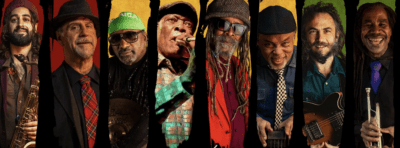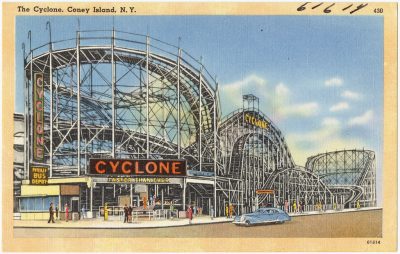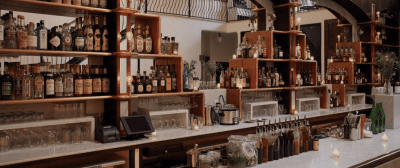Photo illustration by Johansen Peralta
Ralph McDaniels and the story of ‘Video Music Box’: ‘We really made Brooklyn hot’
On the podcast this week, the creator of the seminal hip hop public access show discusses the life and legacy of 'Video Music Box'
Like what you’re hearing? Subscribe to us at iTunes, check us out on Spotify and hear us on Google, Amazon, Stitcher and TuneIn. This is our RSS feed. Tell a friend!
Ralph McDaniels has forgotten more about hip hop than most people have ever known.
The creator and host of the seminal New York City public access show “Video Music Box,” which debuted in 1983, McDaniels—“Uncle Ralph” to his fans—had a decades-long run documenting the evolution of hip hop from the front row and the backstage.
“When hip hop first started, there was maybe 500 people that were into it,” says McDaniels, who is this week’s guest on “Brooklyn Magazine: The Podcast,” produced in conjunction with the annual On Air Fest. “We just focused on those 500 people. We didn’t care about getting to 5,000. And eventually those 500 people became so influential that it influenced millions. If you can do that, you can get a movement going.”
Of course now, nearly 40 years on, the movement is at the heart of global culture. And “Video Music Box” is the subject of a new documentary, out now on Showtime, called “You’re Watching Video Music Box.” Directed by Nas—yes, that Nas—the documentary is a layered telling of the story of “Video Music Box,” the story of hip-hop in the city and the personal journey of McDaniels himself, born in Brooklyn and raised in Queens.
https://www.youtube.com/watch?v=Xiz8sixXNLo
The idea for a show came to McDaniels while working as an engineer in public broadcasting. He had no on-camera experience, but a lifelong affinity for “Soul Train” and its host Don Cornelius, and Dick Clark’s “American Bandstand.”
“Those are two of my biggest influences,” he says. He remembers looking around at public television and not seeing shows that catered to all of the public. “Where’s the shows for the Black people at?” he asked. ”I’m a product of the 60s and 70s. My parents went to the march on Washington, saw Martin Luther King. I listened to Malcom X albums. I know what it is. Let’s get involved. So that’s where the hip hop energy came from. And I said, ‘Look let’s put something together that is a reflection of what I like.’”
That’s how “Video Music Box” was born. But it wouldn’t be long before the show, which started two years after MTV launched and five years before “Yo! MTV Raps” aired, to take on a life of its own.
The documentary features never-before-seen (or only-once-before-seen) clips of some of the game’s biggest stars in their earliest years. There is thrilling footage of and interviews with everyone from Biggie to Jay-Z, L.L. Cool J, Wu-Tang Clan, Fat Joe, Roxanne Shante, Tribe Called Quest and dozens of others.
“The thing about MTV is that nobody had cable in 1981 in New York,” says McDaniels. And even if they did, they wouldn’t be seeing what was happening in the streets in real time. “We just said, ‘Let’s just go with what makes us feel good.’ And that was it. And that’s hip hop. Hip Hop didn’t invent anything, it re-invented everything. It took all these different sounds from rock and roll with Run DMC to one of my favorite groups out of Brooklyn, this group called Smif-N-Wessun, and they used samples of reggae songs, and James Brown.”
What made Video Music Box so special was that it emerged as a show featuring not just videos, but club shows and interviews with the hottest hip hop acts before the mainstream ever took notice. And once mainstream took notice, a lot more money entered the picture. Corporations bought up smaller labels, McDaniels was suddenly dealing with marketing folks and PR teams and various reps when previously he had had direct access to artists.
“It got a little more complicated,” he says. “When that happens, the culture kind of gets watered down.”
To complicate matters for McDaniels, Mayor Rudolph Giuliani sold the city’s television station in 1995, forcing him to find a platform wherever he could. We discuss all of that. Plus how McDaniels managed to keep his show funded for so long, by throwing parties, printing t-shirts, and promoting gigs. Ultimately he would get into the business of directing videos himself, making music videos for the likes of Nas, Roxanne Shante, MC Lyte and more.
“We were doing whatever we could do to raise some dough and look like we’re a big deal,” he says.
If the documentary is any evidence, McDaniels is a big deal. Uncle Ralph, who is currently working on digitizing his archives and is a frequent fixture at lecture halls and libraries, remains an un-corruptible enthusiast—the Walter Cronkite of hip hop, the Don Cornelius of the streets.
“In the early 2000s when gentrification was in full effect, we were sitting on the stoop watching it happen,” he says on the podcast. “We were like, ‘Yo, man, we really made Brooklyn hot.’ That’s why everybody’s coming here.”
Check out this episode of “Brooklyn Magazine: The Podcast” for more. Subscribe and listen wherever you get your podcasts.
You might also like 


























